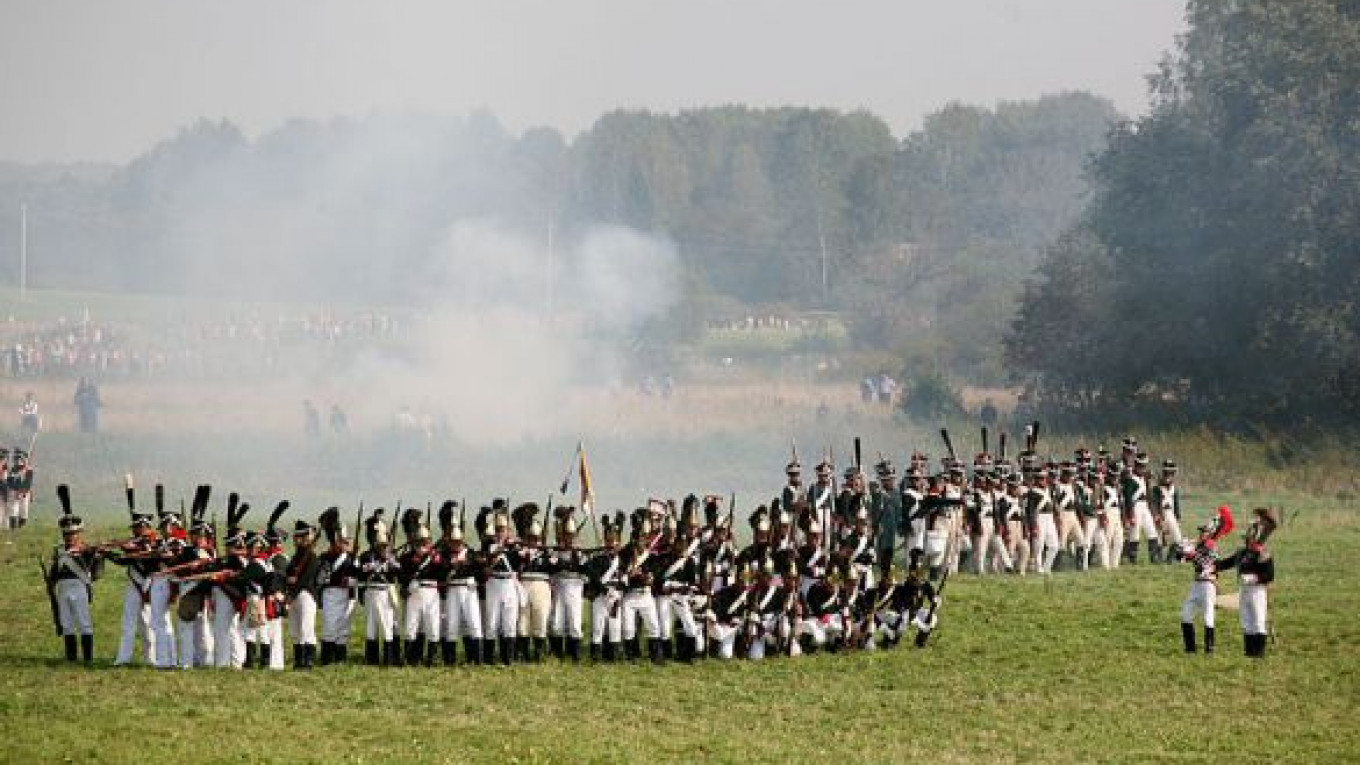BORODINO, Moscow Region — President Vladimir Putin used the 200th anniversary of one of the bloodiest battles of the Napoleonic Wars to call for unity and patriotism, while tens of thousands of spectators flocked to the Borodino battlefield for an enormous, rain-soaked re-enactment.
In brief remarks, Putin praised the heroism of the more than 44,000 Russian soldiers who died in the battle and said patriotism was the key to Russia's victory against Napoleon and in World War II, which also raged through this rural town about 125 kilometers west of Moscow.
"The Russian people's greatest contributions to their homeland's development come when we are united," Putin said. "Patriotism is part of that unity and the key to all our great victories. As our national anthem goes, 'That's how it was, that's how it is, and that's how it always will be.'"
As many as 200,000 visitors braved rain and unseasonably cold weather to watch the elaborate re-enactment featuring about 3,000 hobbyists in period uniforms.
Moscow city and regional authorities budgeted $35 million to commemorate the anniversary of the Patriotic War of 1812, partly as an attempt to whip up patriotic sentiment. Putin was the first Russian head of state since Tsar Nicholas II to visit Borodino on the battle's anniversary.
Putin evoked Borodino at a campaign rally in February, when he urged supporters to defend Russia against vague foreign forces, seen as a reference to opposition activists; recited Mikhail Lermontov's "Borodino"; and invited Russians to lay down their lives for the nation.
Some visitors on Sunday seemed to follow Putin's patriotic lead, describing the battle as evidence of Russia's strength in the face of ever-encroaching foreign invaders.
"Russia destroyed Napoleon. It destroyed Hitler. It will destroy any other foreign power that tries to encroach on her land," said a man wearing a Cossack uniform, who half-jokingly accused an American reporter of being a CIA agent.
Another man with a white beard, Konstantin Yershkov, led a column of monarchists, carrying portraits of Tsar Nicholas II and General Mikhail Kutuzov, the leader of the Russian army in 1812 and the architect of the scorch-and-burn policy that led to the destruction of the Grande Armee.
"Glory to Russian arms! Glory to the Russian military!" he bellowed as soldiers in French uniforms marched past on a manure-strewn road. "There is an element of play in it, of course," Yershkov said to a reporter before returning to taunt the "French."
The rain dampened actors' and spectators' clothes, but not their enthusiasm. Small children ducked under police cordons and poked between adults to get a better view of the action.
The crowd oohed and ahhed with each resounding boom of heavy cannons, which ejected giant smoke-rings, and explosive charges simulated the cannon balls' return to earth. At times, the haze from the cannons and rifles obscured the battle from view.
The Battle of Borodino —? immortalized in Leo Tolstoy's "War and Peace" — was the largest of Napoleon's Russian campaign of 1812. Victory for the French came at a high cost, and Napoleon's army never recovered its strength. Facing shortages and a fierce winter, Napoleon withdrew his last forces in December 1812.
"This is a holy place, not only because of what happened in 1812, but also what happened in 1941," said Igor Bordachenkov, a 40-year-old historian who participated as a Spanish soldier. "It's a symbol of the glory of Russia."
The re-enactors tended to be historians, military veterans, artists and teachers, said Andrei Mahlow-Gras, 42, a historian who played Tsar Alexander I, a role that consisted of standing on the sidelines for the entire battle. (In real life, Alexander I waited out the battle in St. Petersburg.)
They don't get paid for their work and must cover the costs of their uniforms. Bordachenkov frowned as he poked at the buttons on his uniform. "The buttons are fake. Real ones would be too expensive, especially on a historian's salary," he said.
Napoleon was played by U.S. actor Mark Schneider. "We're going to win the battle today, and possibly, it will be the greatest battle in French history. … We have a large army, and conditions are good. I expect victory," his character told Channel One television before the battle.
About 400 foreigners participated in the event, including many French nationals. (In a scare Friday, five of the French re-enactors went missing for a few hours while hunting for mushrooms in woods near the battlefield. A search party found them unharmed.)
The presence of former French President Valery Giscard d'Estaing at Sunday's reenactment provided a further reminder that the wounds of war had healed.
Marc Steiner, a French businessman visiting with several French and Russian work associates, said the event was about building peace rather than renewing old antagonisms.
"This is a friendship ceremony," he said, standing on a hill near the village of Shevardino as the French soldiers pooled below. "We've come with our Russian colleagues to remember the past and build a future without war."
Related articles:
A Message from The Moscow Times:
Dear readers,
We are facing unprecedented challenges. Russia's Prosecutor General's Office has designated The Moscow Times as an "undesirable" organization, criminalizing our work and putting our staff at risk of prosecution. This follows our earlier unjust labeling as a "foreign agent."
These actions are direct attempts to silence independent journalism in Russia. The authorities claim our work "discredits the decisions of the Russian leadership." We see things differently: we strive to provide accurate, unbiased reporting on Russia.
We, the journalists of The Moscow Times, refuse to be silenced. But to continue our work, we need your help.
Your support, no matter how small, makes a world of difference. If you can, please support us monthly starting from just $2. It's quick to set up, and every contribution makes a significant impact.
By supporting The Moscow Times, you're defending open, independent journalism in the face of repression. Thank you for standing with us.
Remind me later.


